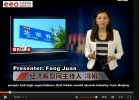

By Sheng Chao (盛超)
Issue 626, July 1, 2013
Nation, Page 15
Translated by Laura Lin
Original article: [Chinese]
An article last month in the Beijing Evening News declared that: "one-third of news going viral on microblogs are rumors." Citing a survey called China New Media Development Report, 2013 (中国新媒体发展报告(2013)), the article referred to the "chaos" of China's microblogging platforms. Since then, this form of media has received a wave of mainstream attention in China.
There are two points in particular worth noting.
First, the production and dissemination of rumors is mentioned specifically in the report. No matter what one's stance may be on a particular subject, we can all agree that a rumor is a bad thing, typically spread by people with ulterior motives conspiring to sabotage and disrupt social stability.
Thus the propensity toward rumor would seem to mean that tighter controls need to placed on the world of microblogging. But that would be a mistake: microblogging is just a channel for information dissemination and the expression of views. In itself, the Internet does not drive the production of rumors.
As Harvard Law School Professor Cass Sunstein pointed out on his book "On Rumors: How Falsehoods Spread, Why We Believe Them, What Can Be Done," the proliferation of false and damaging information is exacerbated by the precarious and anxious situation in which the people who hear the rumor live. As to whether people believe the rumor, it depends largely on their existing impression of society before they heard the rumor.
Rumors owe their existence to social conditions. The way to stop false information is to find answers from the community itself rather than limiting the scope and means for disseminating information. Open communication channels provide sufficient information about people's situation and their impression of society. This is precisely how we dry up the sources of rumors.
A Low-end Mirror
Rather than regulating and "cleaning up" microblogging, the authorites should learn to understand the public through this medium.
The survey showed other noteworthy characteristic of the microbloggers: they don't have particularly high education levels, are young and have low incomes. As a matter of fact, low-income and no-income groups make up the vast majority of users of this medium, at 92.2 percent.
The data gives the impression that microblogging is low-end so that it doesn't represent the complete reality of society. But on the contrary, this is a reflection of the real world.
This result also corresponds very closely to the "Inverted T-shaped social structure theory" put forward by Tsinghua University Professor Li Qiang (李强) in 2010.
Li's theory says that according to the fifth national census, China's socio-economic status structure of the employed population is similar to an inverted T.
The lower group is too large, and the connection of the lower group with other groups is polarized (or at right-angles).
The "structural tension" of various social groups has effects across the entire society, which challenges China's social stability in a way that of a "pyramid-shape" dynamic does, making it more prone to conflicts.
Thus we can judge that it is not microblogging that is low-end but society itself.
Since microblogging possesses the nature of "We the media," clearly exposing social conflicts, the occurrence of so-called chaos is unsurprising. Resentment, unwarranted questioning, abusive and offensive remarks, minimizing serious problems and even the generation and spreading of rumors should come as no surprise.
For this reason, placing tighter controls on microblogging will not resolve social confrontations involving false information.
On the contrary, it is by reading and understanding the social reality reflected in this form of media -- and then improving conditions in the real world - that we will be on the right path to a more stable and unified society.
News in English via World Crunch (link)

